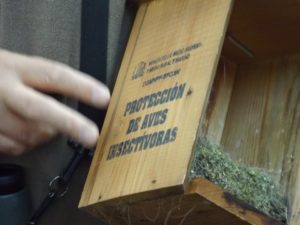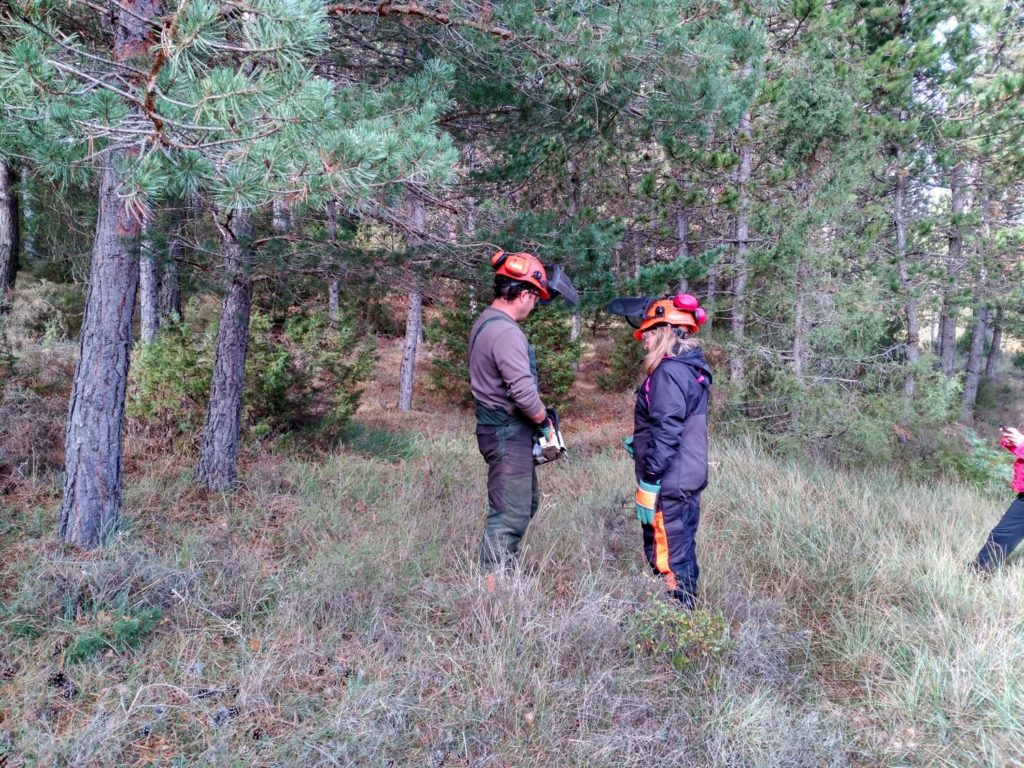The Spanish Foundation “Caja de Burgos” initiated together with the Provincial Council of Burgos a forestry training for rural unemployed persons from the Province. The course aimed at answering the education needs of local unemployed population by offering group trainings. It also supported rural entrepreneurship while promoting sustainable forestry, circular economy and biodiversity protection.
Although the unemployment rate in the Province of Burgos – 8.70% in 2017 – was 10 points below the national average, the rural areas of the Province were suffering from a lack of training and employment opportunities. Consequently, many young people decided to seek for a job in large cities, amplifying rural depopulation. To tackle this challenge, Caja de Burgos, a local foundation focused on social and economic development, and the Provincial Council of Burgos developed three different trainings including one in the forestry sector.
1. Combatting rural unemployment with education opportunities
To combat unemployment in the Province, Caja de Burgos and the Provincial Council of Burgos designed in 2017 trainings to provide job seekers with useful skills. 3 modules answering different needs were created:
- A personal skills and emotional intelligence training to provide job seekers with interpersonal skills and develop their self-confidence,
- A training on job search and computing to help them in writing their applications, practicing their English and training them for potential job interview,
- A practical training on forestry and biodiversity protection.
Involving local actors in funding and managing the training programme
Training modules were an initiative co-launched by Caja de Burgos and the Provincial Council of Burgos. Both organisations financed the training equally with an envelope of 15.000 euros each. The total 30.000 budget financed the three above mentioned courses.
Caja de Burgos and the Provincial Council of Burgos also co-defined the target audience of these training modules. Together, they decided to prioritize long-term unemployed or socially excluded persons and to put a focus on women and young people below 35 years old. Moreover, municipalities with less than 20.000 inhabitants, and where the unemployment rate was the highest of the region, were targeted hosts for these trainings. Huerta del Rey, Salas de los Infantes and Quintanar de la Sierra, were for instance chosen based on these criteria.
Practically speaking, Caja de Burgos was in charge of the organisation and dissemination of the three trainings, with groups not exceeding 15 persons to ensure a participatory approach. Theoretical parts of the training were organised in the Centres of Social Action of each hosting municipality. Centres of Social Action from the mountainous areas of the Province have been particularly interested to host the forestry training since forestry companies and administrations had previously expressed their employment needs. These Centres were also in charge of identifying potential participants in their municipality.
There were also other actors involved, such as CRECE, a local company of the forestry sector. Thanks to their professional expertise, they helped in designing and leading both theoretical and practical parts of the forestry training while the environmental dimension was provided by Caja de Burgos.
These courses are a good example of public and private collaboration at local level. By uniting their resources, expertise and experience, involved organisations managed to join their forces to better tackle unemployment in the rural and mountainous areas of the Province.
A training to encourage employment in the forestry sector in mountain areas
 Called “the forestry sector for the promotion of biodiversity”, this last course aimed at providing technical and practical knowledge for job seekers interested in the sustainable management of forests. The objective was to go beyond job hunting skills by proposing a training in a sector with high labour demand. Such a course is of particular interest in a mountainous area as it takes advantage of endogenous resources of the territory. In addition to forestry, the training also covered the protection of biodiversity, since it was considered as a professional asset in the forestry sector.
Called “the forestry sector for the promotion of biodiversity”, this last course aimed at providing technical and practical knowledge for job seekers interested in the sustainable management of forests. The objective was to go beyond job hunting skills by proposing a training in a sector with high labour demand. Such a course is of particular interest in a mountainous area as it takes advantage of endogenous resources of the territory. In addition to forestry, the training also covered the protection of biodiversity, since it was considered as a professional asset in the forestry sector.
The main objective of the course was to provide all the necessary technical knowledge and skills for an efficient and sustainable management of forests. Another objective was also to encourage a broader vision of forest management, by providing participants with the knowledge on biodiversity protection and risk prevention.
In practice, the course included 36 hours of training, of which 75% were practical exercises directly on the ground. The concrete format of the course enabled participants to apply the theoretical knowledge on machines’ use, identification of interesting shrubs and trees and even construction of nests and shelters for local species. Teachers, on their side, were experts of biodiversity protection, forest management, species identification with not only strong theoretical backgrounds but also a long practical experience in giving classes.
2. Results and benefits
An improved employability
In total, more than 300 persons benefited from one of the 27 training sessions in the three modules organised in the Province in the year 2017-2018. More specifically, 78 persons participated to the forestry training, out of which around 30% were women.
The “forestry sector for the promotion of biodiversity” course was evaluated by participants at the end of each session and a satisfaction rate of 4.5 on 5 was attributed. The course has been recognised as a real accelerator for unemployed persons to find a job in this sector. While there is no official data on participants’ future professional integration, organisers testify that some beneficiaries already found a new position. The Centre for Social Action of the Province of Burgos also assessed the course, stating that it increased the employability of participants in at least 25% of cases.

Global benefits in a mountainous context
The training programme combines solutions to different challenges of the Province of Burgos. The three courses offer major skills to support rural unemployed persons of the area. By proposing computing assistance, language modules and personal development trainings, the programme offers basic skills required on the job market. On the other hand, the forestry and biodiversity course is an opportunity to acquire a more content-related professional knowledge for a sector with a high demand for labour.
By putting a focus on youth, Caja de Burgos and the Provincial Council of Burgos also intend to put an end to the vicious circle of depopulation. To answer this challenge, “it is crucial to promote the development of employment opportunities” recently expressed Ricardo Pizarro Villanueva, Director of Society for the Development of the Province of Burgos, in his interview with Euromontana. Creating economic activity in the mountainous rural areas around Burgos is considered as a crucial tool to generate a spill-over effect and enhance the attractiveness of the region.
In addition, the forestry course encourages biodiversity protection, with a basic knowledge on local species habitats. The programme also promotes the sustainable management of forest, which is not only crucial in terms of the environment but also for risk reduction in mountain areas. A strong knowledge of local varieties and invasive ones for instance contributes to the reduction of forest fires. This scourge is enhanced by depopulation – with inhabitants abandoning their lands in mountain areas, there is a visible increase of the forest coverage. Beside agriculture, the forestry sector is the cornerstone of the fight against forest fires. Thus, this forestry course offers a comprehensive panel of solutions and successfully connects employment, depopulation, environmental and landscape issues.
Download the good practice in PDF!
5 July 2019









